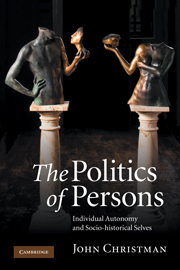3 - The post-modern subject
Published online by Cambridge University Press: 15 December 2009
Summary
We have now seen how those who see the self as essentially social want to put aside talk of a rational autonomous person in considerations of justice and politics. In other circles it is also strongly suggested that the conception of the autonomous person must be abandoned, but for reasons which are in sharp contrast to the perspectives just discussed. In so-called post-modern or post-structuralist approaches to critique and theory – which are hardly a single approach but rather a family with common elements – the idea of a stable subject who can critically appraise elements of herself and her values and whose judgment fixes the justification of principles of justice is thought to be an outmoded and ultimately unacceptable picture of both persons and theories. In some ways, this approach is at the farthest remove from the communitarian views just sketched, if such continua are judged by virtue of how “thick” or “thin” a conception of persons is allowed. For while the social conceptions of the self surveyed urged a “thicker” conception, according to which human thinking is fundamentally social in structure and substantive moral commitments form an irreducible component of those structures, post-modern views urge us to move to the opposite pole, where the notion of a singular unified subject of any sort, however thin the conception, is abandoned.
- Type
- Chapter
- Information
- The Politics of PersonsIndividual Autonomy and Socio-historical Selves, pp. 48 - 65Publisher: Cambridge University PressPrint publication year: 2009



